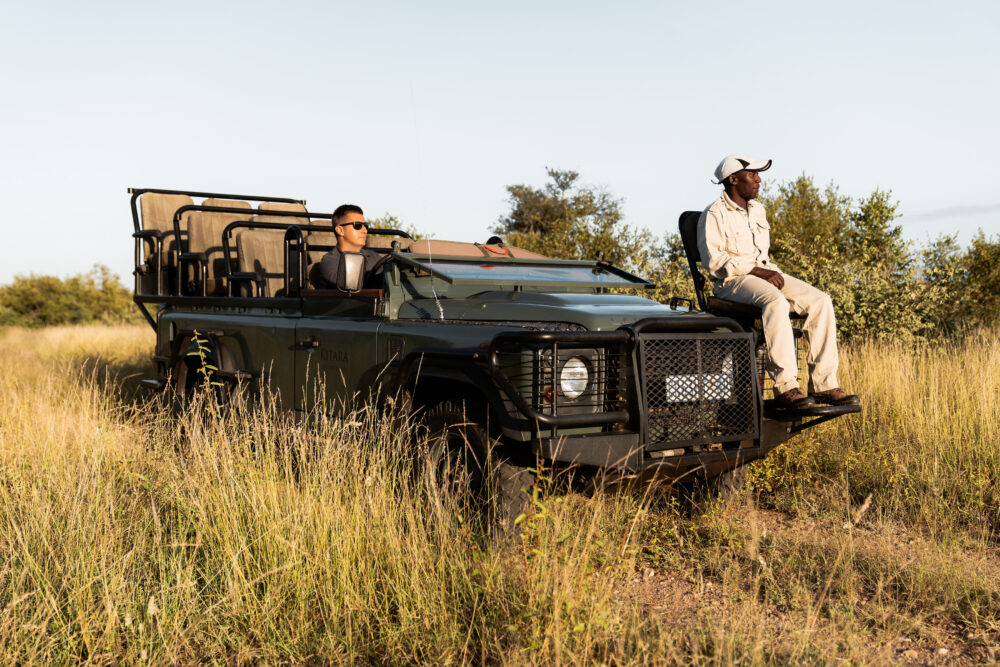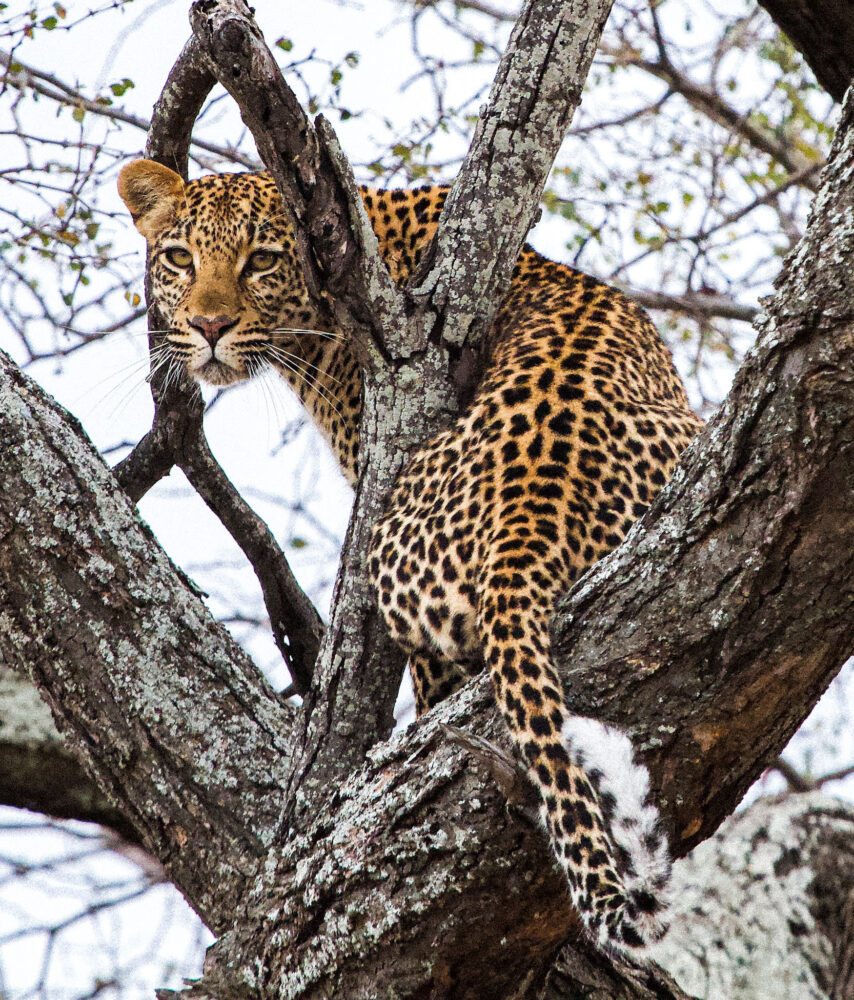Spotted on safari: Last Word Kitara on the The Klaserie Private Nature Reserve in Mpumalanga. Photo: Last Word
It was a sweltering afternoon, and our open-air safari vehicle was rumbling through the arid savannah in Mpumalanga — crunching the dry grass, sticks, branches and stones that lay in the tracks through the veld where elephants, lions and leopards roam.
With the sun on our backs, and the chilly breeze on our faces, we scoured the bushes for a sighting of an animal.
We were exploring the 60 000-hectare Klaserie Private Nature Reserve during a heatwave at the start of this month and were warned that animals tend to take refuge in the shade of trees and in thickets. But still our eyes searched.
Our tracker, Jomo Ndlovu, sat on an elevated seat at the front of the vehicle, with a bird’s eye view of the bush. He kept a close eye out for any movement or animal tracks in the sand and headed our young and energetic safari guide, Connor Zinn, in the right direction.
Occasionally, they would jump off the vehicle to identify animal prints. Their experienced eyes could tell what had made them, how recent the prints were and in which direction they were headed. The anticipation bubbled in our stomachs, but on our first safari, they shied away from the sunlight and to my dismay there was not a feline in sight. Yet.
The guides, belonging to the Last Word Kitara on the Klaserie Private Nature Reserve, arranged for special sundowners at dusk, overlooking the Klaserie River and a solo hyena prowling for lions’ leftovers.
As the sun disappeared into its slumber, the stars began to twinkle. But, in the bush, the night sky is more vast, overwhelming and deliberate in its attempt to engulf us than in the city.
While Ndlovu’s eyes followed the light of his torch to spot any animals that might be around, our guide stopped the vehicle and we sat under the stars. Complete silence. Whiffs of bush dust but mostly fresh air and a reminder of how small we are in this massive galaxy.
Dinner was eaten at a boma with the seven other guests, former South Africans now living in Australia and other guests from Germany. The fire was already lit and our meal was being prepared on a braai stand. Women from the lodge danced to drums and a hyena could be heard in the distance.
 Tracker Jomo Ndlovu
Tracker Jomo Ndlovu
Last Word Kitara offers visitors an exclusive and luxurious experience. The small property on the massive reserve only accommodates 12 people. The expectation of a massive breakfast and dinner buffet was dismissed, because everything was curated and personalised.
The few staffers at the lodge, including the manager, guides and assistants, were attentive to our needs and everyone was on a first-name basis from the start. It was homely, in a way.
During the dinner around the fire, Zinn told us about his experiences in the bush, such as the time when an elephant blocked the road with a massive tree and when he got chased down a track by one. He told us how he had learnt how to understand the animals’ body language and that kept him safe.
I was fascinated by a day in the life of Ndlovu, our tracker. He was quiet on the job as he searched for wildlife, but he also had the closest encounters with animals. He has been a tracker for 15 years — an interest that was honed through training when he learned how to track animal prints, seek out animals from afar and about their behaviours and characteristics.
I asked him if he ever felt scared when an animal approached him and, to my surprise, he said “no”.
“I won’t get scared. Sometimes I can follow a track of maybe a lion and then I find it before the lion can see me. I walk and I look. I walk and I watch where it might be.”
It was evident that he loves his job — which entails a 4am wake-up call and an investigation into any animal activity nearby, communicating with Zinn and deciding on the best route for the day.
The rangers from the different lodges are in constant communication and the advantage of Kitara being on a big reserve is the private experience on safaris, which are slow and intentional. The animals are free to move between reserves and, as only few cars roam around, there is no traffic when enjoying the sight of an animal. It’s more peaceful that way and better for the environment.
Ndlovu’s best experience at Klaserie Private Nature Reserve was watching a female leopard carrying her cubs to safety after a lion was seen in the distance.
“It’s something I want to see again. The leopard had maybe three or four babies and it caught it on its neck and carried it to another den. She took one and then came back and took another one. It looked like she was killing them [the way she was grasping them by their necks] but she was protecting them.”
His scariest experience was when a black mamba slithered up into the vehicle and nearly wrapped itself around him. It spat venom that left a mark on his shorts, and since then, he wears long pants. He has come face to face with an elephant and been chased by lioness and by a buffalo during walking safaris.
“It is a dangerous job, very risky. Snakes, leopards and lions are very dangerous — but especially the black mamba. If it bites you, then in 15 minutes you are gone.”
He’s still waiting to see a pangolin and an aardvark.
On the other side of this was Zinn, a passionate safari guide — an encyclopaedia of animal life. His knowledge didn’t just span the behaviour and anatomy of animals, but also the plants and trees and what role they play in the vast ecosystem.
 One of the reserve’s leopards
One of the reserve’s leopards
While driving into a herd of elephants uprooting trees, he told us they cool themselves by flapping their ears. When their tails are erect and their ears are fully open, it means they have been disturbed by something.
“Our leopards are not as tricky to find as you would expect,” Zinn said. “It just comes down to going into an area that you possibly think there might be, and if you find tracks, then it makes it easier … generally, when we get guests staying for three, four days, chances of them seeing a leopard are about 60%, maybe 70%, which is good. It’s not like 30% or 20%, like other places.”
Another day, we caught sight of antelope, zebras and a thirsty hyena. We stopped for pancakes and coffee in the bush and then continued tracking the lions — which we would see from the balcony of our room at the lodge at night. We caught up with two lazy felines later that day, though.
But, Zinn explained, at Kitara, they try to make the safari about more than the big five, teaching people about their relationship with nature.
“What we try to do out here is to get people off the big-five mindset, because it’s not just about the big five … but just be out there and enjoy whatever comes your way.
“The animals will come automatically, but I always say to people, the moment you start actively looking for something, it’s not going to come because you’re going to start focusing on that, and you’re going to miss everything else.”
The stay at Kitara was a chance to embrace solitude. With few people around and magnificent scenery, I reconnected with nature and got to understand the intricate ecosystem. I made new friends and appreciated the importance of keeping our animals safe and honouring their presence in our world.
One thing I will carry with me — it’s the animals’ world and we’re just living in it. Respect it.
The journalist’s trip to Klaserie Private Nature Reserve and stay at Last Word Kitara was sponsored by Last Word Intimate Hotels and Safari Camps.